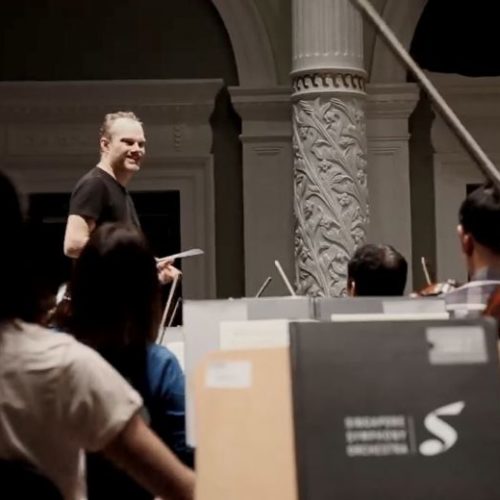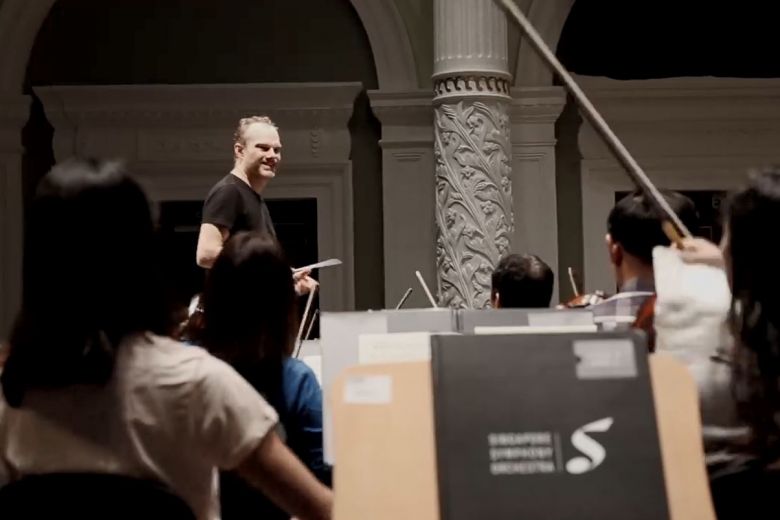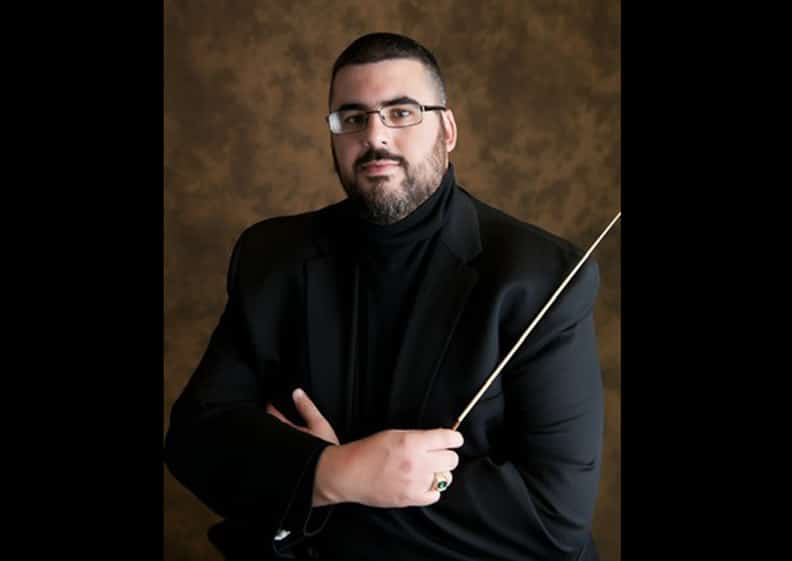Second job for Lars Vogt
mainThe German pianist, presently conductor of the Royal Northern Sinfonia in Newcastle-Gateshead, has been named music director of the Orchestre de chambre de Paris, starting next July.
Brexit insurance?


The German pianist, presently conductor of the Royal Northern Sinfonia in Newcastle-Gateshead, has been named music director of the Orchestre de chambre de Paris, starting next July.
Brexit insurance?

Our attention has been drawn to this incident…

A social media activist has circulated a video…

A concert at the Teatro Maggio Musicale to…

The musicians picked their moment to blank the…

Session expired
Please log in again. The login page will open in a new tab. After logging in you can close it and return to this page.
Good news… Vogt is a wonderful conductor. And the orchestra is one of the best of France.
http://www.orchestredechambredeparis.com/
He is an excellent pianist, but definitely not the best conductor. The problem, very often, is that people who have successful careers as soloists decide one day that they want to conduct a concert, without being aware that it is a difficult task. We, orchestras, can give give a complete performance even if we have the worst conductor on the podium… these soloists very often are not aware that they are not really conducting. After “conducting” their first concert think they have “the gift”, and decide to go into conducting careers. To these soloist I can only say:
1- Very often you are not conducting, leading or shaping. It is us who is doing the job.
2- If you need to speak more than 25% of the rehearsal time to give instructions to the orchestra, you don’t have the technical capacity to conduct.
3- Professional conductors usually who go to music universities or conservatories to study conducting train for years. A conducting Diplom in Austria or Germany is 5 years;in the US people do masters (2 years) + doctoral programs (3 years)… and all this after completing a performance degree in an instrument! These men and women know music theory, aesthetics, master an instrument, can coach a singer in at least 3 languages, can work with a choir, know orchestration, and have technical skills to effectively communicate with the orchestra. They are not idiots who wake up one morning, buy a baton, and say “I am a conductor”.
4- You are getting concerts because you have a name as a soloist and people know your name and that means the orchestra will sell more tickets (!), not because you are a good conductor.
5- Being a good musician is not enough.
I have great respect for conductors. Actually for good conductors. Those who can really get a group of professional musicians (each of them play individually at a soloist or almost-soloist level) who are used to playing together and making them sound even more together; encourage them, give them clear instructions to fullfill his/her musical ideas (tempo, phrasing, sound…), correct mistakes, and help to create a great performance.
Brava! Well said!
So, you are implying that Vogt is a bad conductor? Have you plaid under him recently? I have heard other voices.
PS:
Here is a compilation of conducting excerpts, and all of them are bursting with expressive life:
https://www.askonasholt.com/conducting-compilation/
This is all very well said. Do you have an opinion about Vogt?
The best Brahms 1st piano concert I have ever done in my life was with him at the Keyboard… I was a student and was substituting and have not forgotten that amazing concert! He is wonderful as a pianist. I have not played under his baton (it will take him many years of experience to get to my orchestra!) but I been in the audience in one of his concerts. What he is doing is NOT conducting. He thinks he shapes and phrases, but he is not leading and no-one really pays attention, because there isn’t enough useful information. So, basically he is choreographing.
He can’t do it and does not do it : conducting.
So, I must be totally wrong. Only orchestral players can judge a conductor.
Mediocre pianist at best. Has zero charisma. His brahma concerti are stiff and simply bad. Not a pianist and certainly not a conductor. An ass kisser coming from money and played his cards right. All his recordings are mediocre at best.
The RNS (the musicians), as far as I know, love their conductor.
Frau: This is a nice list. But the real proof only comes from standing in front of an orchestra and trying to conduct it. Some people with qualifications just can’t do this, and even the best have to learn about the people skills required to conduct well. It is certainly possible to go from being a musician to being a conductor. Ashkenazy would be a good example.
Saxon: Ashkenazy is the worst example you could find. He is another fine example of soloist who buys a baton and thinks can conduct. Ashkenazy is a terrific pianist and a lovely person, but he can’t conduct.
So, if what is needed for a soloist to develop a conducting skills is experience conducting an orchestra… why do people study so long to get a conducting degree? Conducting needs artistry, musicianship, theoretical skills, communication skills, leadership, accompanying skills, psychology etc. and all at a high level! I don’t think those who enroll in major conducting programs in London, Vienna, Berlin, and Weimar are idiots who don’t know what is neccesary to be a conductor.
Experience standing in front of an orchestra is not enough. Ashkenazy… yes he has gotten a bit better, but he is really an awful conductor.
I have a very impressive recording of Ashkenazy performing Sibelius 7. Whatever he does in front of the orchestra, it worked at least in that case, and that is the only thing that counts. As Norman has explained, also Furtwängler was not ‘really’ conducting. Probably Frau Geigerin would put him in the same category of ‘terrible conductors’. Maybe players should not merely want to be instructed of their entries but want to ‘submerge’ in the total interpretation of the work. If people like Furtwängler, Gergiev, Vogt, etc. etc. don’t have a ‘good’ technique, one should listen to the results.
Why is is that the negative comment is always so much more popular than the positive one ? Is speaking ill necessarily speaking truth ?
As a Parisian, I look forward to hearing Mr. Vogt. The orchestra has taken a real step forward under Douglas Boyd and I hope Vogt builds on that.
For many people, it is easier to be negative than positive. There is a difference between being critical and being negative, the latter mindset is ‘playing it safe’ – while giving the impression that the author is ‘in the know’.
Negative comments are not always more popular on this site. The reason so many people gave thumbs up to FrauGeigerin’s comment is because they relate to the sentiment that thinking you want to conduct doesn’t mean you should. So many of us toil away at our instruments for decades, only to have one clueless guy after another stand on the podium, “instructing” us. For those of you not in the business, just remember that when it comes to conductors, incompetence abounds. Critics and audience members will leave a concert, spellbound, thinking the magic they experienced was due to the charlatan standing in the middle, instead of giving credit to the composition and the actual players. It creates more than a little resentment when the guy making the big bucks and receiving all the glory is the one getting in the way and wasting valuable rehearsal time. Of course they enjoy picking up their arms and being enveloped in waves of sound. Who wouldn’t? Many are called. Few are chosen.
Indeed. But one should not generalize. With the classical museum pieces that every player knows by heart, charlatanie is possible, but any other work needs a good conductor to bring the different parts of the score together into an integrerated whole, which would be impossible for the players to do that on their own. Orchestral performing is not merely players playing their parts.
Joke form the Vienna Philharmonic:
A conversation at the beginning of a rehearsel:
Player a): What will he be doing this morning?
Player b): I don’t know, but WE are doing Brahms two.
“Conducting is the last bastion of quackery outside the medical profession.” — Stephen Bishop-Kovacevich
Nice but nonsensical. Conducting is not the same as playing the piano.